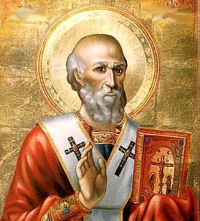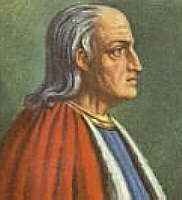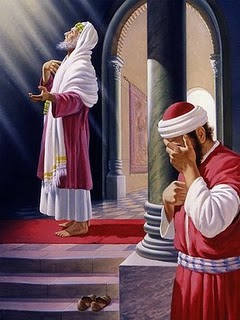
For the next few blog posts, I am honoured to be in dialogue with Alexis, a good friend and president of the university Christian Orthodox society. He regularly blogs about theological issues, which you can find at http://alexis-florides.blogspot.co.uk/. In these ensuing discussions, we will attempt to explain and defend our positions on various topics, in some sense articulating what our denomination holds to be true of Christianity. We hope that through this process we and you will grow in faith, understanding and the ability to listen to views contrary to our/your own. It should be an interesting experiment, and I hope you enjoy it as much as we will. (Nathan Hood )
God is categorically distinct from the world. That means that the categories we use to understand creation cannot be applied to God without them being radically redefined in relation to Him. God is not just different from objects and beings, but is has an uncompromisingly different existence, as God is not only the source of our being but the fullness of being itself. Language breaks down in application to the divine, as it is stretched beyond its capacity when used to refer to that which is other to the concepts we know from our worldly environment. This entails that created objects by themselves cannot by their very existence reveal the glory, holiness and majesty of God, as they have a fundamentally different character to the one and unique God. Moreover, as our cognitive and emotional capacities have been corrupted by evil, sin and suffering, they are unable to perceive the presence of Yahweh within the world without change. Thus, due to the categorical difference and effects of creation’s falleness, there is a gap between God and humanity.
This void was broken and bridged by the Word of God. The eternal Word, creator and sovereign over all creation, held nothing for himself before the Father, taking on human flesh and dwelling among us. He did this to save the world, bringing light to darkness, overthrowing the power of death through His life, death and resurrection. He has come to transform the creation to how it ought to be: glorifying and enjoying God. We can participate in this dramatic change by confessing Jesus, the Word, is Lord. In doing so, we are opened to His radical, dynamic and pulsing love, overhauling our past selves to live in union with Him. In being united to Christ, we partake in His death to sin and victory over death in the resurrection, thus giving us eternal life. Moreover, this restores the relationship between us and God, as our sin is paid for in full by the blood of Jesus, the only innocent human. This is the gap between God and humanity bridged; Jesus is ‘God with us’, the new temple, and in His saving action and union with us the fullness of God is brought forth into our lives. It is only in the gift of Himself do we have a) knowledge of God b) a right relationship with God.
Yet we are still created beings, who cannot listen to God without mediation (indeed, the ancient Jews were so terrified of the presence of God they tied a rope to the high priest when he would enter the inner sanctum, in case he died from touching the ark of the covenant by accident!). Whilst the human nature of Jesus has ascended to heaven to receive all due honour and glory until the parousia/end times, we are brought into union with Him by the activity of the Holy Spirit. The Spirit draws us into this relationship through various instruments. One such gift is the Scriptures. We call them the Word of God because they are witnesses to the life giving Word, Jesus. They have no value in themselves: their purpose is to testify to the glory of God and pointing to the salvation found in Christ, communicated by faith. They are inspired by the Spirit for this purpose. As such, they possess authority on all Christian life, as they reveal the Word sufficiently to humanity. Authored by God, they guide us into salvation, and in doing so transform our lives in uniting us to the Word. As such, the Scriptures have a key role within the life of the Church, as the not only communicate to us the wonder of Christ, but are a dialogue between us and God, an address which calls us to even greater union with Jesus in the dynamism of the Holy Spirit which inevitably gives us new life.
‘Tradition’ is the corpus of the covenant community’s experience and reflection upon the upturning grace of the Word. It is also a gift of the Spirit, who guides the body of Christ into greater truth and love in their walk with God. This means that tradition is an interpretative practice: it is not the revelation (the Word) nor a witness to the Word (Scripture) but an interpretation of that witness. It offers us a hermeneutic for approaching the ineffable yet immanent God. It is guided by the Spirit, such as at the Council of Nicea (325 C.E.) where bishops from all over the Roman Empire gathered to clarify whether Christ was divine or not. Led by the Spirit, the assembly favoured the interpretation that Jesus is God, and that He is of one substance with the Father.
However, tradition is human interpretation of the witness the Scriptures provide of the Word. It may be guided by the grace of the Spirit, but it is still the categorisation of revelation by fallible human minds. And as its source is non-divine, it does not derive the same authority as Scripture, for the precisely the fact that human tradition can err and not testify to the Word. Whilst Scripture was also written by humans with minds prone to sin, the Holy Spirit breathed their words, providing the circumstances and context for the author to witness to Christ. By contrast, tradition is a response: whilst it may be guided by the Spirit, this guiding is not equivalent to the inspiration of biblical texts, as it is an interpretation of that already given. Jesus actions affirm this: whilst He would not alter one iota of the Law and prophets, recognising that they were an address from God, He continually reprimanded the Pharisees for displacing faith in God for adherence to human regulations and tradition. Their interpretation of how to respond to God was misplaced, and hence did not honour Yahweh. Hence, Scripture must be normative of tradition, as it cannot fall into sin, and it is only that which further enables the preaching of the Word which is valid tradition. Thus, it is an interpretative matrix, not the Word itself – that title belongs to Christ, and the instrument He uses, the Scriptures.
- Nathan Hood

It is with great pleasure that my good friend (fellow theology student, and devout & active member of the Presbyterian church) Nathan, and I will be sharing a series of joint blog posts, discussing certain theological, and in particular ecclesiological matters. (Our first one being Scripture and Tradition) We hope they are of interest, and will enforce a better understanding and appreciation of each others traditions. Nathan and I both actively, and humbly give much of our time to our churches, and this is a great opportunity to share and discuss the ways in which we grow within our Christian communities and spiritual lives, following Christ: our Way, Truth and Life (John 14:6) in dialogue and love. (1 John 4:8)
Please visit Nathan's blog at:
Holy Tradition is the doctrine of faith, the law of God, the sacraments, and the ritual that is handed down by the true believers and worshippers of God, by word and example from one to another - from generation to generation.
The Church of the Living God, as 'the pillar and ground of the truth (1 Tim 3:15) is the sure repository of Holy Tradition. All believers are united by the Holy Tradition of faith, and form the 'body of Christ' (1 Cor 12:12). St Irenaeus highlights that the truth can only be found within the Church, and it is Holy Tradition that guarantees this truth and validity:
'We ought not to seek among others the truth, which we may have for asking from the Church; for in her, as in a rich treasure-house, the Apostles have laid up in its fullness all that pertains to the truth, so that whosoever seeketh may receive from her the food of life. She is the door of life.'
Holy Scripture is books written by the Spirit of God through men, sanctified by God, called Prophets and Apostles. These books are commonly termed 'the Bible' (Βίβλος), signifying that these sacred books deserve attention before all others.
Which is more ancient, Holy Tradition or Holy Scripture?
The original, and most ancient instrument for spreading divine revelation is Holy Tradition. From Adam to Moses there were no sacred books. Our Lord Jesus Christ Himself delivered His divine doctrine and ordinances to His disciples by word and example - not by writing. The same method was followed by the Apostles at first, spreading the faith and establishing the Church of Christ. This emphasises the necessity of Tradition. Books can be made available to a small part of mankind, but tradition to all.
'So then, brethren, stand firm and hold to the traditions which you were taught by us, either by word or mouth or by letter.' (2 Thessalonians 2:15)
Through the Holy Scriptures, divine revelation is preserved. We read the words of the Prophets and the Apostles, as if we were living and listening with them.
Why is tradition necessary?
Holy Tradition is what acts as our guide to the right understanding of the Scriptures, and is needed for the right ministration of the Sacraments and the preservation of the sacred rites and liturgical life of the Church.
'Of the doctrines and injunctions kept by the Church, some we have from written instruction, but some we have received from apostolical tradition, by succession...For instance let us mention before all else the very first and commonest act of Christians, that they who trust in the name of our Lord Jesus Christ should sign themselves with the sign of the Cross.. to turn to the east in prayer..the words of invocation in the change of the Eucharistic bread and of the cup of blessing..Are they not all from this unpublished and private teaching, which our Fathers kept..'
Saint Basil the Great here highlights the importance of Holy Tradition, passed down from Christ's apostles on Pentecost (Acts 2) , to the Church's fathers and teachers; preserving the orthodox apostolic teaching, worship and practice.
The fullness of the true faith and doctrine is much too vast to be held in the consciousness of isolated members of the Church. Nathan argues that tradition is 'human interpretation of the witness of Scriptures', however it is clear from the Church's history that the Holy Spirit has been deposited from generation to generation, safeguarding and preserving the true orthodox faith and apostolic teaching - what the Orthodox Church refers to as Holy Tradition. This is not human interpretation; but rather the very act of the Holy Spirit through time.
Does Scripture oppose Tradition?
The Holy Scriptures are one of the sources of Tradition. The problem lies in the fact that at the time of the reformation, the western church tried to oppose and separate scripture to tradition. No such opposition should exist! Scripture and tradition belong to the one life of the Church, moved by the same Holy, Life-Giving and guiding Spirit. It is important to remember that the canon of holy books, which affirms their inspired character is established by Tradition. The inspired nature of Scripture can only be established and guaranteed by our Mother Church. Saint Cyprian of Carthage boldly states 'he can no longer have God for his Father, who has not the Church for his mother.'
The Bible cannot be separate from the Church. The Holy Spirit guides the life of the Church, with its councils - declaring truth. Tradition is both the past and present - it is the never ending work of the Spirit, revealed to the Prophets of the Old Testament, consecrated through the incarnation of the Logos, and remains active in the purification, illumination and theosis of the faithful within Christ's body. The Scriptures are divinely inspired and infallible, not because they are historically or scientifically accurate, but because they are theologically true; and it is through the living Tradition of the Church that we understand these theological truths, and the correct meanings of the texts. This is why the Orthodox Church emphasises the importance of reading the Scriptures within the eucharistic body of Christ. Even though they are divinely inspired, the interpretive operation of the Holy Spirit is lost when one cuts themselves off from the Church and its tradition. It is within the Church, as a loving communion, that we are led to truth, and unity with Christ. Without this tradition, which has preserved, and continues to preserve the faith in our Lord and Saviour Jesus Christ, protecting Christ's body from heretical teaching, granting us the fruits of the Holy Spirit through the sacramental work of the Church, a pure and loving relationship with God would be unattainable.







_-_Portr%C3%A4t_des_Martin_Luther_(Lutherhaus_Wittenberg).jpg)











